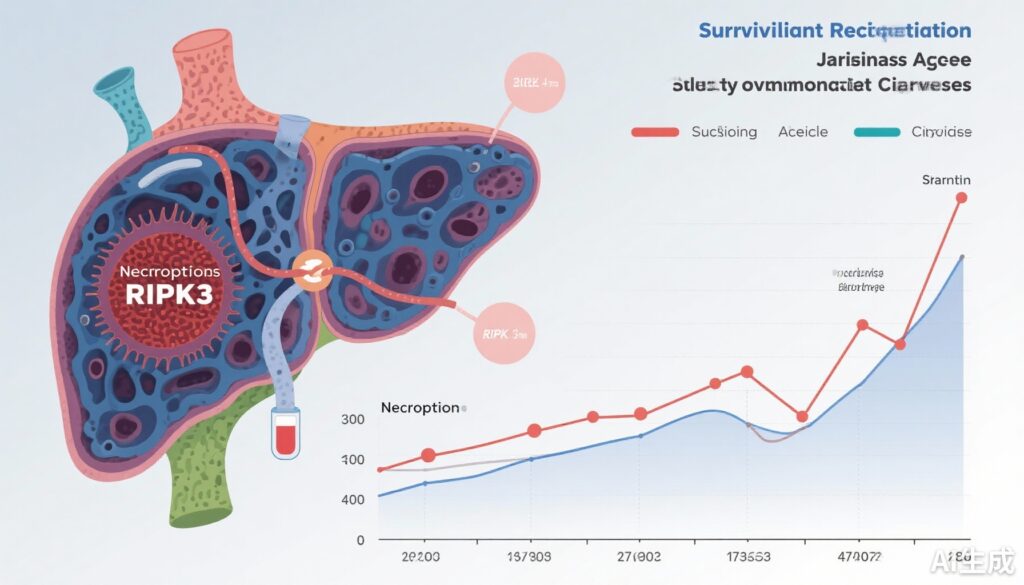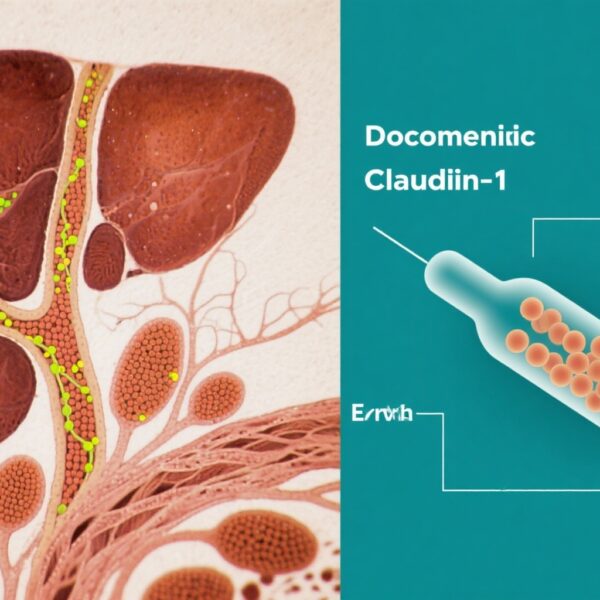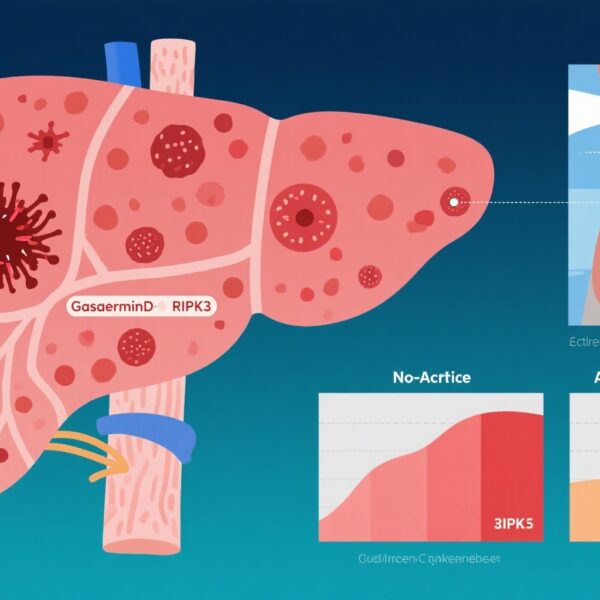Highlight
– Elevated plasma RIPK3 levels strongly predict multi-organ failure and mortality in patients with acute decompensation (AD) and acute-on-chronic liver failure (ACLF).
– RIPK3 outperforms other cell death markers in correlating with hepatic and renal dysfunction in cirrhosis exacerbations.
– A novel mortality prediction model incorporating RIPK3, CLIF-C Organ Failure score, and white blood cell count shows high diagnostic accuracy and external validation.
– Increased hepatic RIPK1 expression in ACLF supports the necroptotic pathway’s role in disease progression and mortality, enabling targeted therapeutic strategies.
Study Background
Acute decompensation (AD) of cirrhosis and its severe form, acute-on-chronic liver failure (ACLF), pose significant clinical challenges due to rapid deterioration and high short-term mortality. Current prognostic tools primarily rely on clinical scoring systems such as the CLIF-C Organ Failure score but remain imperfect in predicting individual outcomes, underscoring the need for biomarkers that reflect underlying pathophysiology. Recent research points to regulated necroptosis—a programmed form of necrotic cell death mediated by receptor-interacting protein kinases RIPK1 and RIPK3—as a pivotal mechanism driving liver injury, systemic inflammation, organ failure, and death in cirrhosis. However, clinical translation of necroptosis markers as prognostic tools has lacked robust validation. This study by Verma et al. addresses this gap by identifying and validating plasma RIPK3 as a novel biomarker predictive of AD/ACLF outcomes.
Study Design
This prospective multicenter study enrolled a derivation cohort of 200 individuals with acute decompensation of cirrhosis, among whom 153 had ACLF. At two timepoints—baseline and day 7—plasma was assayed for markers of programmed cell death: cytokeratin-18 fragments M30 (apoptosis) and M65 (total cell death), RIPK3 and MLKL (key necroptosis executors), and gasdermin D (pyroptosis). Clinical data included organ failure scores and laboratory parameters. A mortality prediction model was constructed using RIPK3 levels, CLIF-C Organ Failure (OF) score, and leukocyte count abnormalities. This model’s performance was validated externally in three independent cohorts totaling 356 patients. Additionally, liver biopsies from a fourth distinct AD/ACLF cohort (n=21) underwent immunohistochemical staining for RIPK1 and necroptosis markers, correlating hepatic expression with outcomes.
Key Findings
Plasma levels of all cell death markers increased with escalating disease severity. Notably, RIPK3 showed the strongest correlation with multi-organ failure, particularly hepatic and renal impairment (p <0.05 for each). Baseline RIPK3 above 2.261 times the upper limit of normal (ULN) was independently associated with both disease progression (adjusted odds ratio [aOR] 4.85; 95% confidence interval [CI] 2.36-9.94; p <0.001) and mortality (aOR 4.74; 95% CI 2.38-9.44; p <0.001).
Dynamic changes in RIPK3 correlated with clinical trajectory: rising levels predicted worsening organ dysfunction and death, whereas decreasing levels were seen in survivors with clinical improvement (p <0.001).
The mortality prediction model integrating elevated RIPK3, CLIF-C OF, and leukocytosis or leukopenia demonstrated strong discrimination in the derivation cohort (AUC 0.839) and remained robust in two external validation cohorts (AUC 0.752 and 0.794). Temporal validation in a third cohort confirmed the model’s applicability (AUC 0.796).
On tissue analysis, hepatic expression of RIPK1 was significantly increased in patients with ACLF compared to those with AD alone. Higher hepatic RIPK1 levels correlated with mortality, supporting that necroptotic signaling within the liver contributes directly to organ failure and adverse outcomes.
Expert Commentary
This study delivers a compelling translational advance by validating RIPK3 as a clinically actionable biomarker reflective of necroptotic cell death pathways in AD/ACLF. The strong independent association of plasma RIPK3 with progression and death emphasizes necroptosis as both a pathogenetic driver and a potential therapeutic target. Unlike apoptosis markers, RIPK3 selectively identifies necroptosis, a pro-inflammatory cell death mode exacerbating systemic inflammation in cirrhosis.
The multilayer approach—combining plasma biomarker quantification with histopathological confirmation—reinforces biological plausibility. Integrating RIPK3 into prognostic scores improves predictive accuracy beyond conventional organ failure scores alone, facilitating better risk stratification.
Limitations include relatively small biopsy sample size and need for longitudinal validation in diverse populations and comorbidities. Also, translating RIPK3 measurement into routine clinical use requires assay standardization and evaluation of cost-effectiveness.
Mechanistic insights into RIPK1/RIPK3 involvement hint that pharmacological inhibition of necroptosis could attenuate organ damage, opening avenues for clinical trials targeting this pathway in AD and ACLF.
Conclusion
Verma et al. establish RIPK3 as a novel, robust biomarker for predicting organ failure and mortality in acute decompensation and acute-on-chronic liver failure. Its incorporation into prognostic models significantly enhances risk stratification, enabling more personalized patient management. The study also validates necroptosis as a key pathological mechanism contributing to disease progression, with hepatic RIPK1 expression further substantiating intrahepatic involvement. These findings lay the groundwork for future necroptosis-targeted therapies in high-risk cirrhotic patients, representing a promising shift towards mechanism-based interventions to improve outcomes in AD and ACLF.
Funding and trial registration
The study was funded by institutional grants and academic bodies supporting hepatology research. No clinical trial registration number is reported for this observational biomarker study.
References
Verma N, Garg P, Kaur P, Munjal S, Vinod AP, Valsan A, Andreola F, Kumar P, Saeidinejad M, Engelmann C, De A, Premkumar M, Taneja S, Mookerjee RP, Duseja A, Jalan R. Identification and validation of RIPK3 as a novel biomarker to predict outcomes in patients with acute decompensation of cirrhosis. J Hepatol. 2025 Aug 12:S0168-8278(25)02405-5. doi: 10.1016/j.jhep.2025.07.034. Epub ahead of print. PMID: 40812668.



